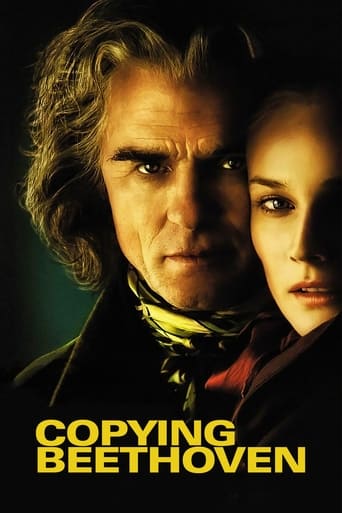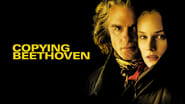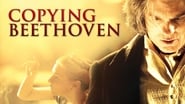guy-bellinger
How to make a movie about Beethoven while managing to live up to the stupendous composer he was? And more particularly, as is the case here, about the making of his immortal, exhilarating, uplifting Ninth Symphony? Mission impossible? Well, judging from a series of past artistic failures on the theme, one would be tempted to say yes. For sure, a few of the roughnecks who dared enter such uncertain terrain should have thought twice before getting burned. Take Abel Gance for example and his outrageously overblown « Un grand amour de Beethoven », to say nothing of his equally ridiculous « 10th Symphony ». Feeling wary for fear of watching just another of those boring phoney biopics about a great genius is then justified. But the prejudice is soon - and happily so - to be disproved by what is given to see and to hear. As a matter of fact, as Agnieszka Holland's movie unfurls, the viewer (and listener) feels more and more involved... to the point of being downright carried away. It looks (and sounds) as if where Abel Gance failed (achieving to image Ludwig Van's fiery romantic music), Agnieszka Holland (a very underrated director), succeeds as for her in converting the try.
Not that the movie is perfect (No one is obliged to do the impossible!). There ARE one or two debatable points. The main criticism addressed to « Copying Beethoven » concerns the script. Many are those who blame the writers (Stephen J. Rivele and Christopher Wilkinson) for taking liberties with the facts. And it is true that although building on a historically accurate situation (in 1824, after the death of his favorite copyist Schlemmer, Beethoven, who had encountered problems with his new collaborator Peter Gänzler, asked his publisher for a new one), the two authors soon take a side road. In real life, the composer was assigned two male copyists whereas in the film, there is only one - and a female one to top it all! A well-founded objection if one sticks to hardcore historical truth. But art wants what art wants: poetic licence has always existed and is acceptable insofar as the spirit of the material is respected, which is the case here, at least in my opinion. It is worth noticing by the way that the film would not have existed but for this transgression - imposed by the producers. Moreover, if - as advocated by Coleridge - you use suspension of disbelief, you will be amply rewarded. First owing to the fact that the character of Anna Holtz is well-drawn and engaging (the young woman is a true lover of music and never plays the seduction card). Also because Diane Kruger embodies her with talent, always finding the right tone, whether it be respect, fear, admiration, determination or revolt. And, what matters most, she constantly exudes a sense of dignity. All in all, the strong presence of Anna Holtz as performed by the radiant Diane Kruger gives the film a more modern (and hence universal) dimension to the film than if it had been scrupulously historically correct. The second blame often put on 'Copying Beethoven' is its way of representing Beetoven's deafness. The question is relevant: a correct representation of a deaf person on a screen does pose problems. Before making a movie featuring someone either deaf or hard of hearing, the authors indeed have a choice to make, either putting themselves (and us for that matter) in the place of the deaf character(s) or cheat a little and pretend that a spoken exchange, necessary to keep the action moving, is possible. Anyway, whatever their option, what they will show us will not be conform to reality. And whatever they choose, they will be criticized for it.
In the present case, he scriptwriters opted for the second solution and my position about that will echo the one I expressed above about historical faithfulness: let's accept this convention and let's enjoy the film without playing those who know best. Beethoven managed to exchange views with Anna Holtz... All right, why not ? After all, actors do not REALLY die on the set no more than an actress actually delivers a baby! A film is NEVER a record of reality, it is always A READING OF REALITY. Whether it is a good or a bad reading is the question, not whether things happened exactly the way they are shown or not. This premise admitted, the spectator can then take advantage the rich exchanges about art, music, creation, solitude, womanhood... between the master and his not-so-obedient pupil. And admire without reservations the fabulous performance delivered by an inspired, unrecognizable Ed Harris in what may be the role of a lifetime. This all-American is downright amazing: he rings more true in his embodiment of Beethoven than Ludwig himself!I will conclude by witnessing to what has been one of the most intense emotional experiences I have been through, meaning by that the highly inspired rendering of the 'Ninth Symphony'. This amazing sequence is - even if nobody ever mentions it in film histories - a genuine piece of anthology. It works exceptionally well- at full capacity - on three levels : music of course (with a perfect performance by the London Symphony Orchestra), drama (the suspense coming from whether Beethoven will be able or not to conduct his piece till the end) and editing (the various shots and camera angles being cut in exact accordance with the pulse of the music), with the effect that each separate element (music, image and story) are blended together only to carry you away out of this world to a superior continuum, a kind of nirvana where only ravished souls access. If only for this fabulous time of rapture, 'Copying Beethoven' is not to be missed. So, my recommendation is: leave your prejudices aside and let yourself go. You will not regret it. A cocktail of history, great music, excellent filmmaking, exciting dialogue, brilliant acting and storytelling, that's an offer you can't refuse !
brokersong
This movie made me feel....well....what am I trying to say...nauseated.Every cast read like they were trying their worst, including Harris, who is a good actor and was fantastic in Pollack. Music insertions during the entire movie were inappropriate. Beethoven is one of most beloved geniuses but not a single actor or scene depicted such brilliance and utter tragedy. Some of the scene were near (poorly executed) copies of scenes from other books/movies.The movie dabbles in a maze of confusing themes: I struggled to follow the ever-changing theme and constantly distracted by ridiculously poor - acting, writing, scenery, music segment choices and placements, and relentless one-liners.I was determined to continue watching the movie. In fact, I watched it twice in a row. And the most important and perhaps one scene that can help common folks, like myself, to look into the soul of brilliance, would have been during the "9th" concert scene. Yet, I was entirely disappointed with the lack of synchronization between the music and conducting and unpreparedness of musical acting (pretending to look like a real musician) by the acting cast. Despite my best effort to understand and like the movie, even just a bit, this movie is a disaster. Maybe all is not lost - teachers can use this movie to show students how not-to-act and how not-to-direct/produce.I saw (twice). I cringed. I wrote my first movie review.
Prairie_Wolf
I came upon this movie while looking for something to watch on cable TV. I have always enjoyed Ed Harris. I also love classical music. So, I decided to give it a go. From the first moments, I was completely engrossed. The music was splendid, the cinematography was gorgeous, and the storyline was compelling. But most of all, Ed Harris's performance was stellar. He deserved an Academy Award for this role. Like a chameleon, he disappears into each character he portrays and this was no exception - his acting was stupendous, admirable, incredible. The movie held my interest from start to finish.I have read where Copying Beethoven has been compared to Amadeus. When I first saw Amadeus in the theater, I knew it would win the Academy Award for Best Picture and that one or both of the main actors would win an Academy Award. The only comparisons I can make to the two movies are: Ed Harris should have won an Academy Award for his performance as Beethoven. Similarly, both movies had sensational music. And, each movie was glorious to the eye, titillating to the imagination, and heavenly to the ear.How did this movie fall through the cracks? Many viewers are missing a true classic if they have not had the opportunity to see this movie - and that is a colossal shame!
PetalsAndThorns
Use a passionate creative genius, forget history, make stuff up, add f'ed-up camera work and sub-par acting... Bam! Voila, this movie happens. 104 minutes of my life that cannot be returned to me.The story is full of historical inaccuracies and out-right fiction. It's so far-removed from the truth that one cannot rightly even consider this a biopic. Even calling it "historical fiction" is a reeeally big stretch.The jolting camera work gave me a headache. Beethoven's personality and music, alone, should have be enough to give this movie plenty of fire and passion - the "creative" camera effects were unnecessary and ineffective.The acting is atrocious. Hestitantly, I gave a couple stars just for the costumes and score, which were both "ok", not spectacular, by any means, but there was certainly an effort made in these two departments.The rest of the film, however, is total garbage.If you want to see an imagined story about Beethoven that's actually good, skip this stinkbomb, and go straight to Immortal Beloved.





